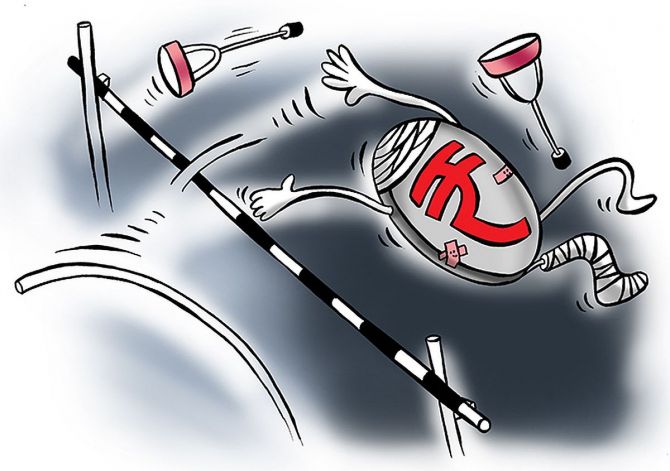 | « Back to article | Print this article |
Revenue from divestment has fetched Rs 40,000-50,000 crore against target of Rs 2.10 trillion.

Tax collection and the proceeds from divestment in state-owned entities are likely to miss the Budget estimates target by Rs 7 trillion this fiscal year, two senior officials said.
The Budget for FY21 estimated Rs 24.23 trillion to come from direct and indirect taxes and Rs 2.10 trillion from divestment, aggregating Rs 26.33 trillion.
The revised estimates show the total at around Rs 19.33 trillion, or 26.58 per cent less than what had been budgeted for.
On the tax front, an internal assessment by the Centre suggests gross tax revenue for 2020-21 may fall short by around Rs 5 trillion against the budget estimate even if the government achieves pre-Covid levels, i.e. January-March of 2019-20, said one of the two officials cited above.
On the other hand, the Centre may not be able to get the funds it had hoped to mop up through disinvestment in the public sector by the end of FY21 because the sale of Air India, Bharat Petroleum Corporation Ltd (BPCL), and Container Corporation of India (CONCOR) could not be completed.
Looking at the tax figures individually, direct tax collection has seen a negative growth rate of 12 per cent between April and December 2020.
There are also fears of a shortfall in Goods and Services Tax (GST) collection.
Despite the record collection of Rs 1.15 trillion in December, the mop-up was 14.9 per cent less at Rs 7.79 trillion in the first nine months of the current fiscal year against Rs 9.09 trillion in the corresponding period of the previous one.
Sources say the Department of Investment and Public Asset Management, a nodal department for the government’s strategic sale, attributed the shortfall to the pandemic even as the markets have risen spectacularly.
Barring the transfer of shares in public sector undertakings such as Hindustan Petroleum to other state-run entities and the ongoing share sale in Steel Authority of India Ltd, nothing much has been done so far.
Through this, the government has managed to garner Rs 40,000 crore.
Economists said the delay was owing to the lack of preparation and groundwork needed for big-ticket disinvestment, saying this year could have fetched high valuation.
“In terms of divestment, it is clear the target will not be met because concrete steps have not been taken.
"Too much time was spent tackling the pandemic in the first half and by the second half of the year the government may have missed the bus on good valuation,” said Madan Sabnavis, chief economist, CARE Ratings.
Any kind of divestment would have fetched good valuation, particularly in the second half of the year, he said.
“This may not be replicated in the next fiscal year,” Sabnavis said.
D K Joshi, chief economist, CRISIL Ratings, said this was not surprising.
“Last year when the Budget was made, there was no indication of the pandemic.
"It (pandemic) came as a surprise, something no one imagined, so it is not surprising that the tax collection targets are off the mark.
"If the economy is expected to shrink 7.7 per cent, how can you expect taxes to meet the target?
"However, tax collection has improved, but we are staring at a deficit as the first half showed negative growth.”
In GST collection, what was lost in the first six-seven months can’t be restored, though collection was Rs 1 trillion in the last three months.
Economists expect 10 per cent GDP growth next year.
However, personal income-tax may take some more time to get back to normal, they say.
Meanwhile, the Central government’s fiscal deficit till November was Rs 10.8 trillion against the budgeted target of Rs 7.96 trillion.
The fiscal deficit till November was 33 per cent higher than the Rs 8.07 trillion during the same period in 2019-20.